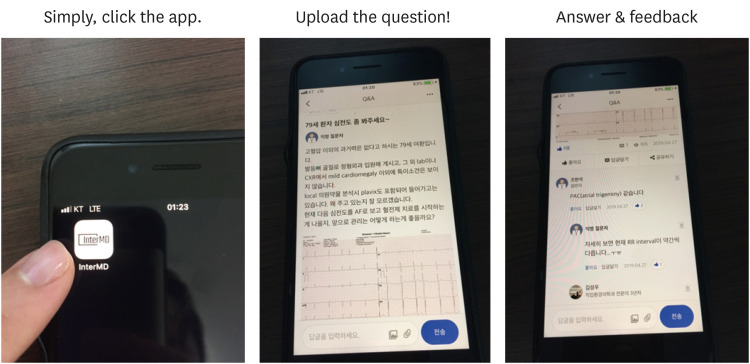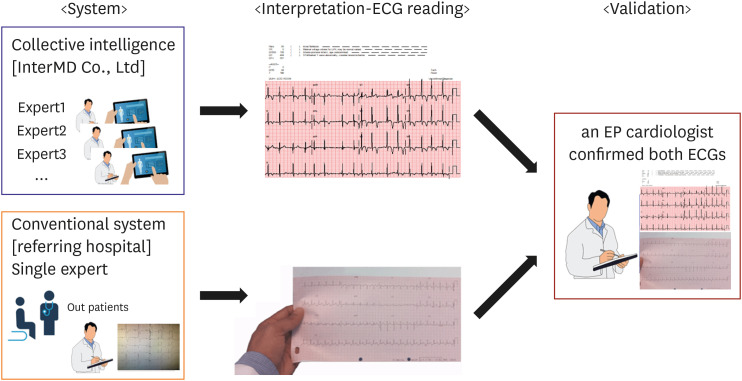Korean Circ J.
2021 Apr;51(4):351-357. 10.4070/kcj.2020.0364.
Comparison of Mobile ApplicationBased ECG Consultation by Collective Intelligence and ECG Interpretation by Conventional System in a TertiaryLevel Hospital
- Affiliations
-
- 1Department of Cardiology, St.Vincent's Hospital, The Catholic University of Korea, Seoul, Korea
- 2Division of Cardiology, Department of Internal Medicine, Dongguk University College of Medicine, Goyang, Korea
- KMID: 2514639
- DOI: http://doi.org/10.4070/kcj.2020.0364
Abstract
- Background and Objectives
A mobile application (app)-based electrocardiogram (ECG) consultation system (InterMD Co., Ltd., Seoul, Korea) using the collective intelligence (CI) and the availability of large-scale digitized ECG data would extend the utility of ECGs beyond their current limitations, while at the same time preserving interpretability that remains critical to medical decision-making.
Methods
We developed a new mobile app-based ECG consultation system by CI for general practitioners. We compared the responses of ECG reading between the mobile app-based CI system and the conventional system in a tertiary referring hospital.
Results
We analyzed 376 consecutive ECGs between December 2017 and May 2019. Of these, 159 ECGs (42.3%) were interpreted by CI through the mobile app-based ECG consultation system and 217 ECGs (57.7%) were analyzed by cardiologists in the conventional systems based on electronic medical record data in a tertiary hospital. All ECG readings were confirmed by an electrophysiologist (EP). The time to an initial response by the CI system was faster than that of the conventional system (6.6 hours vs. 35.8 hours, p<0.0001). The number of responses of each ECG in CI system outnumbered those of the conventional system in the tertiary hospital (3.1 vs. 1.2, p<0.0001). The consensus of the ECG readings with EP was similar in both systems (98.6% vs. 100%, p=0.158).
Conclusions
The mobile app-based ECG consultation system by CI is as reliable method as the conventional referral system. It would expand the app of the 12-lead ECG with the collaboration of physicians in clinics and hospitals without time and space constraints.
Keyword
Figure
Cited by 1 articles
-
A Retrospective Clinical Evaluation of an Artificial Intelligence Screening Method for Early Detection of STEMI in the Emergency Department
Dongsung Kim, Ji Eun Hwang, Youngjin Cho, Hyoung-Won Cho, Wonjae Lee, Ji Hyun Lee, Il-Young Oh, Sumin Baek, Eunkyoung Lee, Joonghee Kim
J Korean Med Sci. 2022;37(10):e81. doi: 10.3346/jkms.2022.37.e81.
Reference
-
1. Blackburn H, Keys A, Simonson E, Rautaharju P, Punsar S. The electrocardiogram in population studies. A classification system. Circulation. 1960; 21:1160–1175. PMID: 13849070.2. Henkens IR, Gan CT, van Wolferen SA, et al. ECG monitoring of treatment response in pulmonary arterial hypertension patients. Chest. 2008; 134:1250–1257. PMID: 18641107.3. Levy D, Salomon M, D'Agostino RB, Belanger AJ, Kannel WB. Prognostic implications of baseline electrocardiographic features and their serial changes in subjects with left ventricular hypertrophy. Circulation. 1994; 90:1786–1793. PMID: 7923663.4. Tonelli AR, Baumgartner M, Alkukhun L, Minai OA, Dweik RA. Electrocardiography at diagnosis and close to the time of death in pulmonary arterial hypertension. Ann Noninvasive Electrocardiol. 2014; 19:258–265. PMID: 24372670.5. Attia ZI, Noseworthy PA, Lopez-Jimenez F, et al. An artificial intelligence-enabled ECG algorithm for the identification of patients with atrial fibrillation during sinus rhythm: a retrospective analysis of outcome prediction. Lancet. 2019; 394:861–867. PMID: 31378392.6. Takeuchi I, Fujita H, Ohe K, et al. Initial experience of mobile cloud ECG system contributing to the shortening of door to balloon time in an acute myocardial infarction patient. Int Heart J. 2013; 54:45–47. PMID: 23428924.7. Ip JE. Wearable devices for cardiac rhythm diagnosis and management. JAMA. 2019; 321:337–338. PMID: 30633301.8. Hsieh JC, Hsu MW. A cloud computing based 12-lead ECG telemedicine service. BMC Med Inform Decis Mak. 2012; 12:77. PMID: 22838382.9. Zakka P, Refaat MM. A scoring algorithm in wide complex tachycardia: Ventricular tachycardia or not ventricular tachycardia? Pacing Clin Electrophysiol. 2019; 42:634–636. PMID: 30903697.10. Wolf M, Krause J, Carney PA, Bogart A, Kurvers RH. Collective intelligence meets medical decision-making: the collective outperforms the best radiologist. PLoS One. 2015; 10:e0134269. PMID: 26267331.11. Heylighen F. Collective intelligence and its implementation on the web: algorithms to develop a collective mental map. Comput Math Organ Theory. 1999; 5:253–280.12. Radcliffe K, Lyson HC, Barr-Walker J, Sarkar U. Collective intelligence in medical decision-making: a systematic scoping review. BMC Med Inform Decis Mak. 2019; 19:158. PMID: 31399099.13. Hannun AY, Rajpurkar P, Haghpanahi M, et al. Cardiologist-level arrhythmia detection and classification in ambulatory electrocardiograms using a deep neural network. Nat Med. 2019; 25:65–69. PMID: 30617320.14. Taye GT, Shim EB, Hwang HJ, Lim KM. Machine learning approach to predict ventricular fibrillation based on QRS complex shape. Front Physiol. 2019; 10:1193. PMID: 31616311.15. Javadi M, Ebrahimpour R, Sajedin A, Faridi S, Zakernejad S. Improving ECG classification accuracy using an ensemble of neural network modules. PLoS One. 2011; 6:e24386. PMID: 22046232.16. Schmidt C. M. D. Anderson breaks with IBM Watson, raising questions about artificial intelligence in oncology. J Natl Cancer Inst. 2017; 109:109.17. Tacchella A, Romano S, Ferraldeschi M, et al. Collaboration between a human group and artificial intelligence can improve prediction of multiple sclerosis course: a proof-of-principle study. F1000 Res. 2017; 6:2172.18. Desai V, Dave D. Is artificial intelligence better than manual methods in diagnosis of electrocardiograms (ECGs) or not? Int J Adv Med. 2017; 4:1463–1465.
- Full Text Links
- Actions
-
Cited
- CITED
-
- Close
- Share
- Similar articles
-
- Corrigendum: Comparison of Mobile Application-Based ECG Consultation by Collective Intelligence and ECG Interpretation by Conventional System in a Tertiary-Level Hospital
- Implementation of Device Independent ECG Reporting System Using Web Development Framework
- Educational impact of an active learning session with 6-lead mobile electrocardiography on medical students’ knowledge of cardiovascular physiology during the COVID-19 pandemic in the United States: a survey-based observational study
- Comparison of Continuous ECG Monitoring by Wearable Patch Device and Conventional Telemonitoring Device
- Identification of Atrial Fibrillation With Single-Lead Mobile ECG During Normal Sinus Rhythm Using Deep Learning



